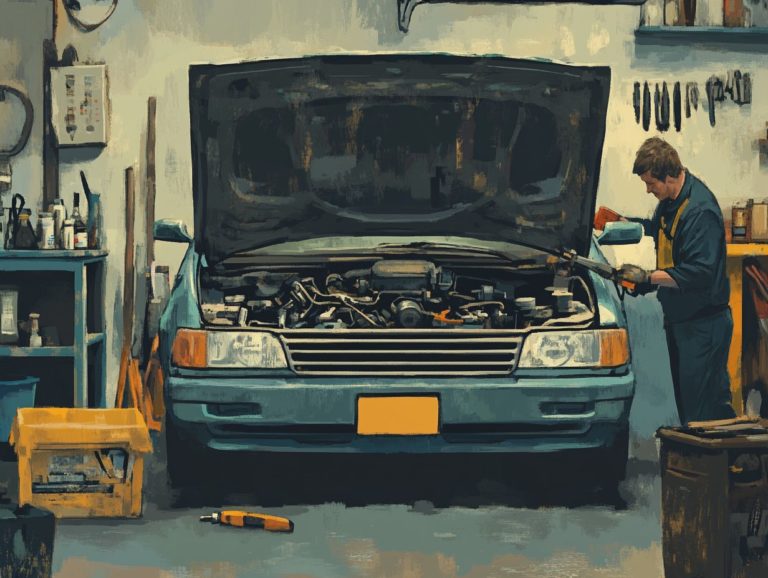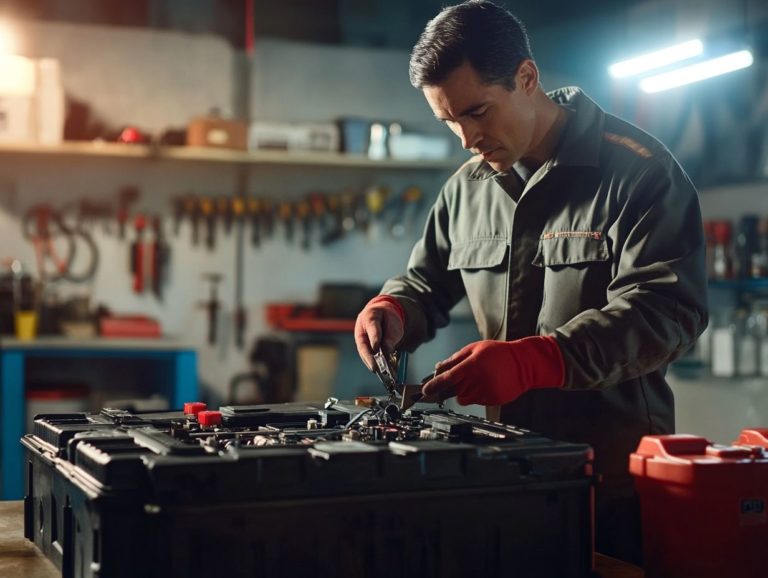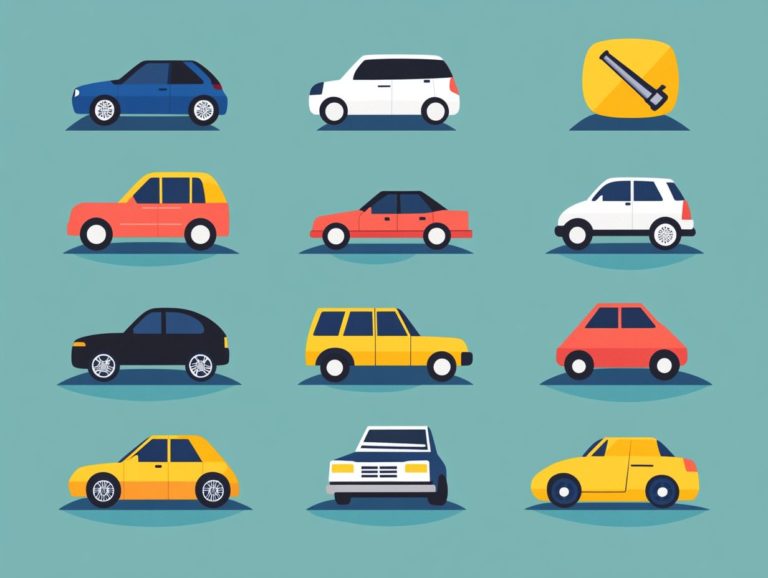What Are the Best Practices for Car Maintenance?
Maintaining your car in peak condition is crucial for your safety, performance, and longevity.
Regular maintenance tasks like oil changes, tire rotations, and filter replacements are essential. These actions can save you from facing costly repairs later on.
But how do you know when your vehicle needs attention? This article explores common warning signs, compares DIY and professional maintenance, and shares best practices to extend your car’s lifespan.
Discover how straightforward, proactive care can keep your ride running smoothly.
Contents
Key Takeaways:
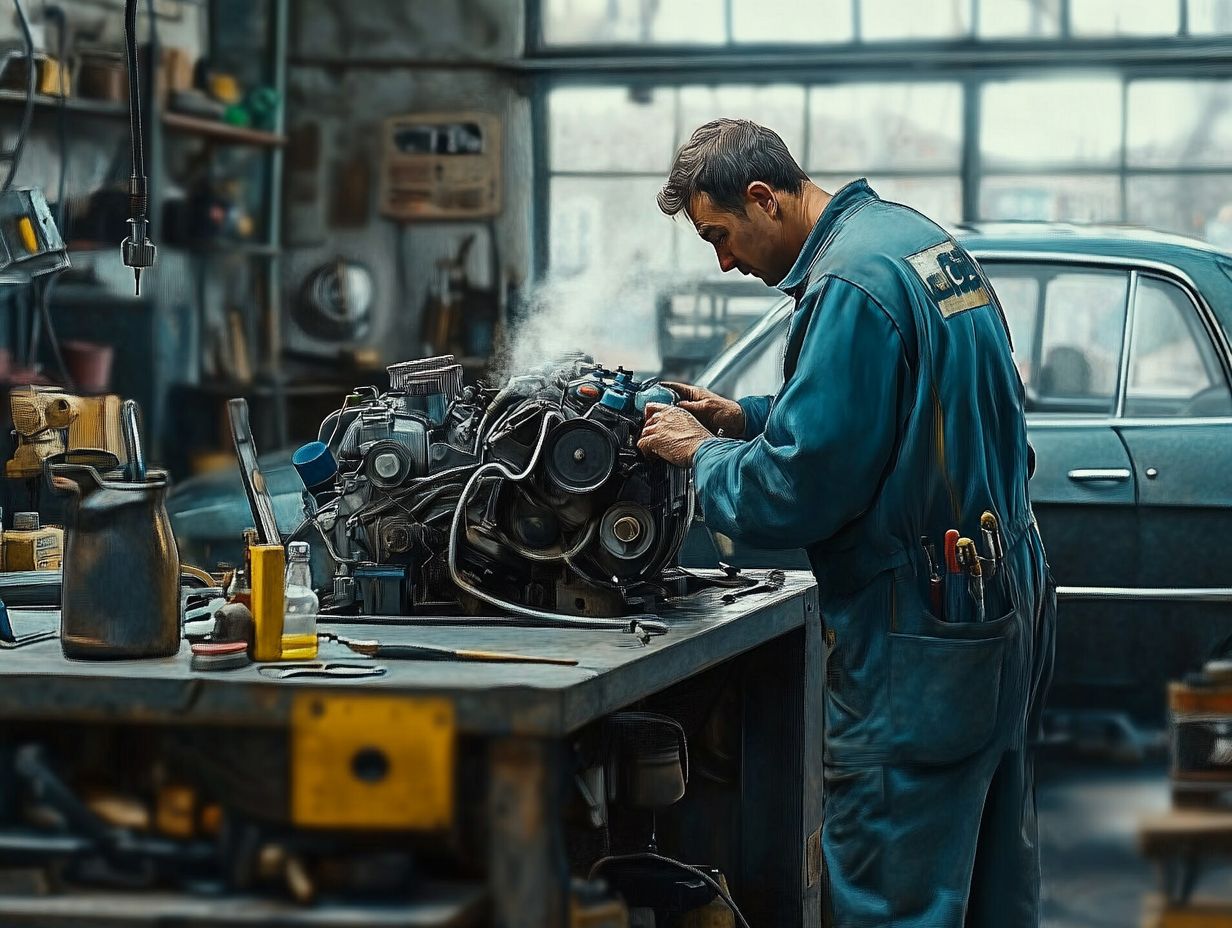
- Regular maintenance tasks like oil changes, tire rotations, and filter replacements are crucial for keeping your car in top condition and preventing costly repairs.
- Spotting warning signs early can save you from serious trouble.
- Whether you choose DIY maintenance or a professional, following best practices is vital for extending your car’s lifespan and ensuring safety on the road.
Why is Car Maintenance Important?
Car maintenance is vital for ensuring your vehicle’s longevity and peak performance. Following a regular servicing schedule not only enhances your engine’s good condition but also reduces the risk of major repairs that come from neglect.
Keeping your vehicle well-maintained ensures safety features work properly, protecting you, your passengers, and everyone else on the road. By sticking to a structured maintenance plan, you can lower repair expenses while enjoying a smoother driving experience.
Regular Maintenance Tasks
Engaging in regular maintenance is essential for keeping your car in peak condition. These tasks enhance performance and longevity.
Services like oil changes keep your engine well-lubricated, while tire rotations promote even wear and prolong tire life. It s also vital to check tire pressure and tread for optimal safety.
Inspecting components such as spark plugs (which help ignite your engine) and belts (which drive various engine parts) can prevent unexpected issues down the road. Cleaning your car not only keeps it looking great it boosts its performance!
Oil Changes
Oil changes are a cornerstone of routine vehicle maintenance and are vital for preserving your engine’s good condition and optimal performance. By regularly changing your oil and oil filter, you remove contaminants that can slow down your engine and extend your vehicle’s lifespan.
It’s advisable to change your oil every 3,000 to 5,000 miles, although modern vehicles with the right oil may go longer. You’ll find various options synthetic, conventional, and high-mileage oils tailored to specific needs, making it essential to choose the right one for your vehicle.
The oil filter is equally important; a high-quality filter ensures proper flow and filtration, significantly affecting engine health. Watch for warning signs like unusual engine noises, a dirty oil appearance, or a dip in fuel efficiency these may signal that it s time for an oil change.
By attending to these factors regularly, you can avoid extensive repair costs down the line.
Tire Rotations and Alignments
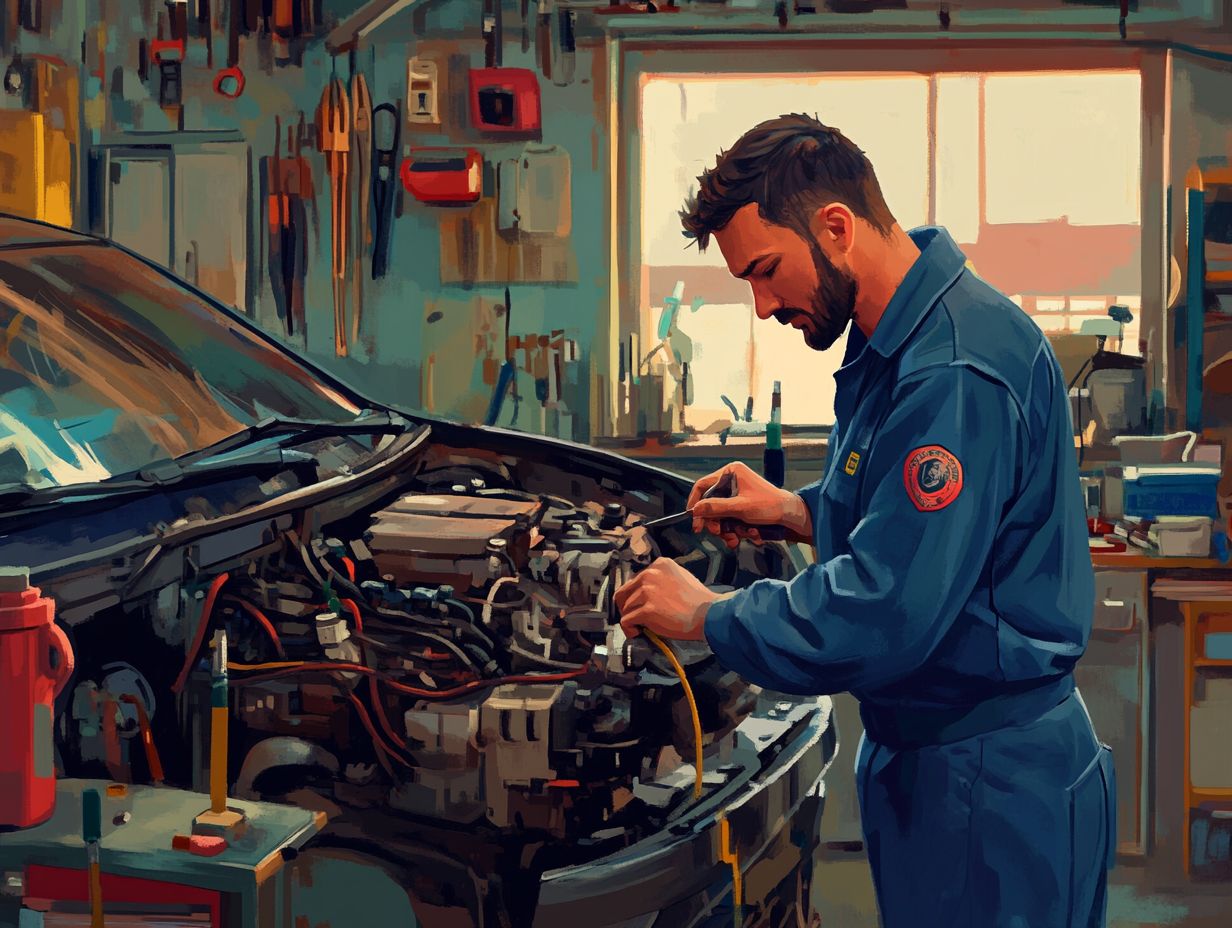
Regular tire rotations and alignments are essential for ensuring your driving remains both safe and efficient. These routines help maintain proper tire inflation and even tread wear. If you neglect them, you risk uneven tire wear, which can compromise handling and fuel efficiency. This negligence can introduce potential safety hazards.
To get the most out of your tires, aim to rotate them every 5,000 to 7,500 miles. Of course, it s wise to consult your vehicle’s manual for specific recommendations. Alongside tire rotations, regular alignment checks are crucial as well. A misaligned vehicle can pull to one side, hindering responsive handling.
Keeping an eye on tire tread depth and ensuring proper inflation not only boosts performance but also significantly enhances safety on the road. Tire maintenance is often overlooked. Yet, it plays a pivotal role in your vehicle s efficiency and the safety of all its occupants. Prioritizing these services is not just smart it s essential.
Filter Replacements
Replacing filters is an important aspect of car maintenance that significantly enhances both your vehicle’s performance and the air quality inside the cabin. By routinely changing the oil filter, fuel filter, and cabin air filter, you ensure that contaminants are effectively removed. This allows both your engine and passengers to enjoy cleaner air.
Don t overlook the transmission filter, either. It plays a vital role in maintaining the cleanliness of the fluid that helps your car’s transmission work, helping your car shift gears more easily.
Neglecting any of these filters can lead to a range of issues, including decreased fuel efficiency, increased engine wear, and the risk of overheating due to restricted airflow. The implications stretch beyond mere performance. A dirty cabin air filter can result in poor air quality, making your drives uncomfortable and potentially posing health concerns for your passengers.
Stay on top of these replacements to keep your car running smoothly. This ensures that your vehicle operates efficiently, transforming your journeys into safe and pleasant experiences.
Signs Your Car Needs Maintenance
Recognizing the signs that your car requires maintenance is essential for preventing minor issues from blossoming into significant repairs. Pay attention to common warning signals, such as the check engine light illuminating, unusual noises, or changes in how the vehicle handles.
These indicators may suggest it’s time for a brake inspection or a comprehensive examination of hoses and other vital components.
Common Warning Signs
Common warning signs that signal your car may need immediate attention include a lit check engine light, unusual engine noises, and the need to inspect belts or check the functionality of your headlights. These symptoms can provide you with critical clues about underlying issues that warrant further investigation.
For example, when that check engine light illuminates, it often points to a range of problems from minor sensor glitches to serious engine dilemmas. Consider having your vehicle scanned for error codes at a diagnostic center to swiftly identify the issue.
If you hear unusual noises like grinding, knocking, or whining, it may indicate complications with the engine or transmission that require professional evaluation. Worn belts can cause overheating or electrical failures, while malfunctioning headlights can jeopardize your safety during night driving.
Regular inspections of these components are essential for maintaining your vehicle s performance and safety.
DIY vs Professional Maintenance
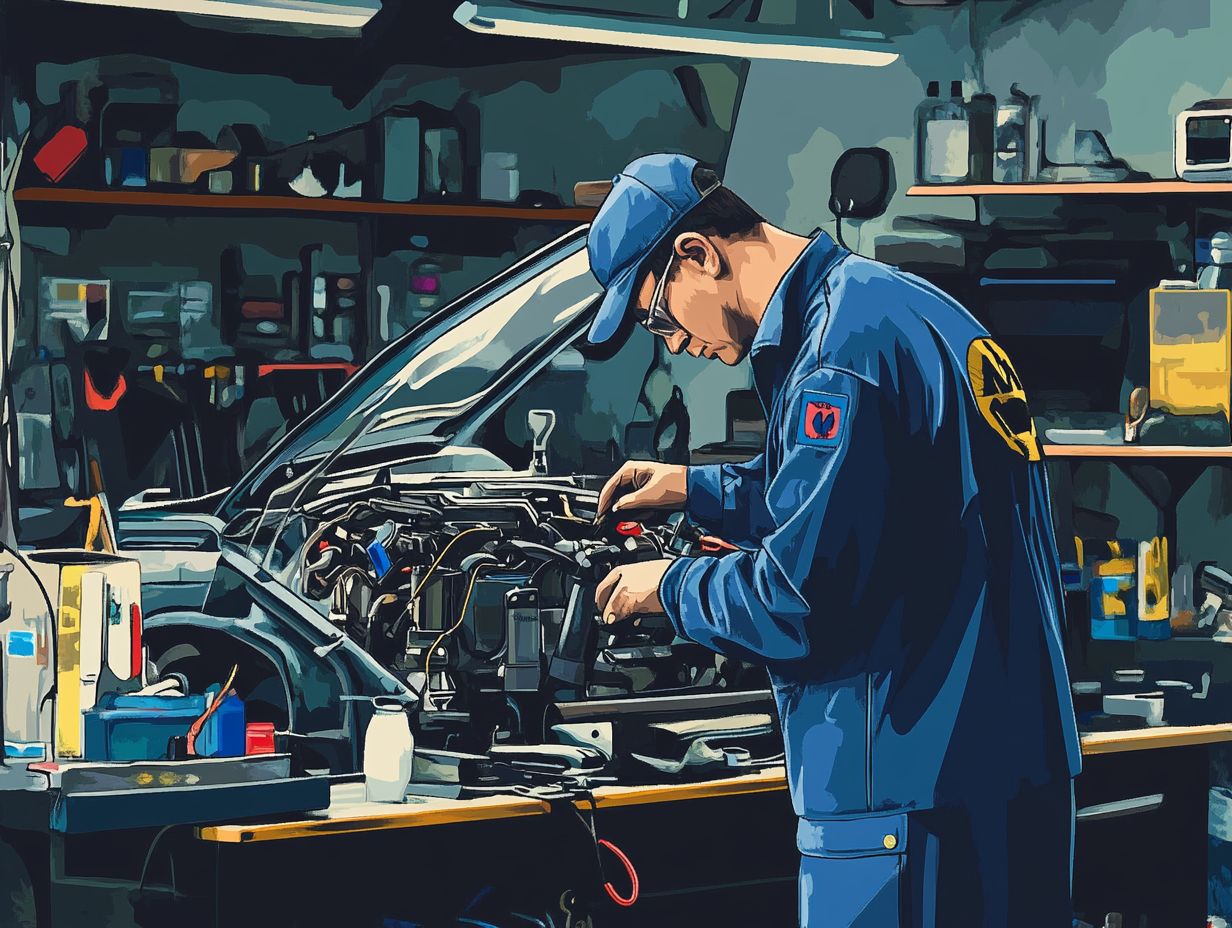
When deciding whether to tackle vehicle maintenance yourself or enlist the help of professionals, it s essential to weigh the advantages and disadvantages of each option.
Opting for DIY maintenance can certainly save you money on repairs and offer a rewarding hands-on experience for car enthusiasts. However, turning to professional maintenance means that skilled mechanics will leverage their expertise. This often leads to a thorough approach that meets all your vehicle’s needs comprehensively.
In conclusion, performing regular maintenance is crucial for your vehicle’s longevity and safety. Stay informed and proactive to ensure that your car remains in top condition.
Pros and Cons of Each Option
DIY maintenance has clear advantages. You save money on repair costs and gain a deeper understanding of your vehicle.
However, consider the downsides. The risk of improper repairs and the time commitment involved can be significant. Professional maintenance, while offering expertise, often comes with a higher price tag.
If you’re good with tools, you might enjoy simple tasks like changing oil or replacing air filters. These tasks not only boost your skills but also empower you to save money over time! Yet, for more complex repairs such as problems with your car’s gears or electrical problems seeking professional assistance is essential to avoid potential missteps.
Home mechanics may also encounter challenges stemming from inadequate tools for specific jobs, which can lead to subpar results. Therefore, it s crucial to weigh each approach. Certain situations, like preparing a vehicle for a road trip, often demand a level of thoroughness that only professionals can provide.
Best Practices for Extending Your Car’s Lifespan
Implementing best practices for car maintenance can greatly enhance your vehicle’s lifespan, allowing you to extract maximum value from your investment.
Essential maintenance strategies involve sticking to a regular maintenance schedule, allocating a budget for upkeep, and routinely inspecting critical components like the suspension, brakes, and fluids. By taking these steps, you ensure that your vehicle remains in top condition for years to come.
Tips for Proper Care and Maintenance
Proper car care entails a series of routine checks and maintenance tasks that you should diligently perform. This includes ensuring that fluid levels are adequate, keeping the battery clean, and inspecting hoses and shocks for signs of wear. These procedures are essential for maintaining your vehicle’s performance and safety.
Regularly inspecting engine oil, coolant, and brake fluids can significantly extend the life of critical components while enhancing overall efficiency. It’s also vital to check the battery terminals for corrosion and ensure that the connections are secure to avert any potential electrical issues.
Paying attention to your vehicle’s suspension system is equally important; inspecting shocks and struts not only contributes to a smoother ride but also improves handling. By adhering to these preventive measures, you can enhance fuel efficiency and ensure that your vehicle remains in peak condition for years to come.
Frequently Asked Questions
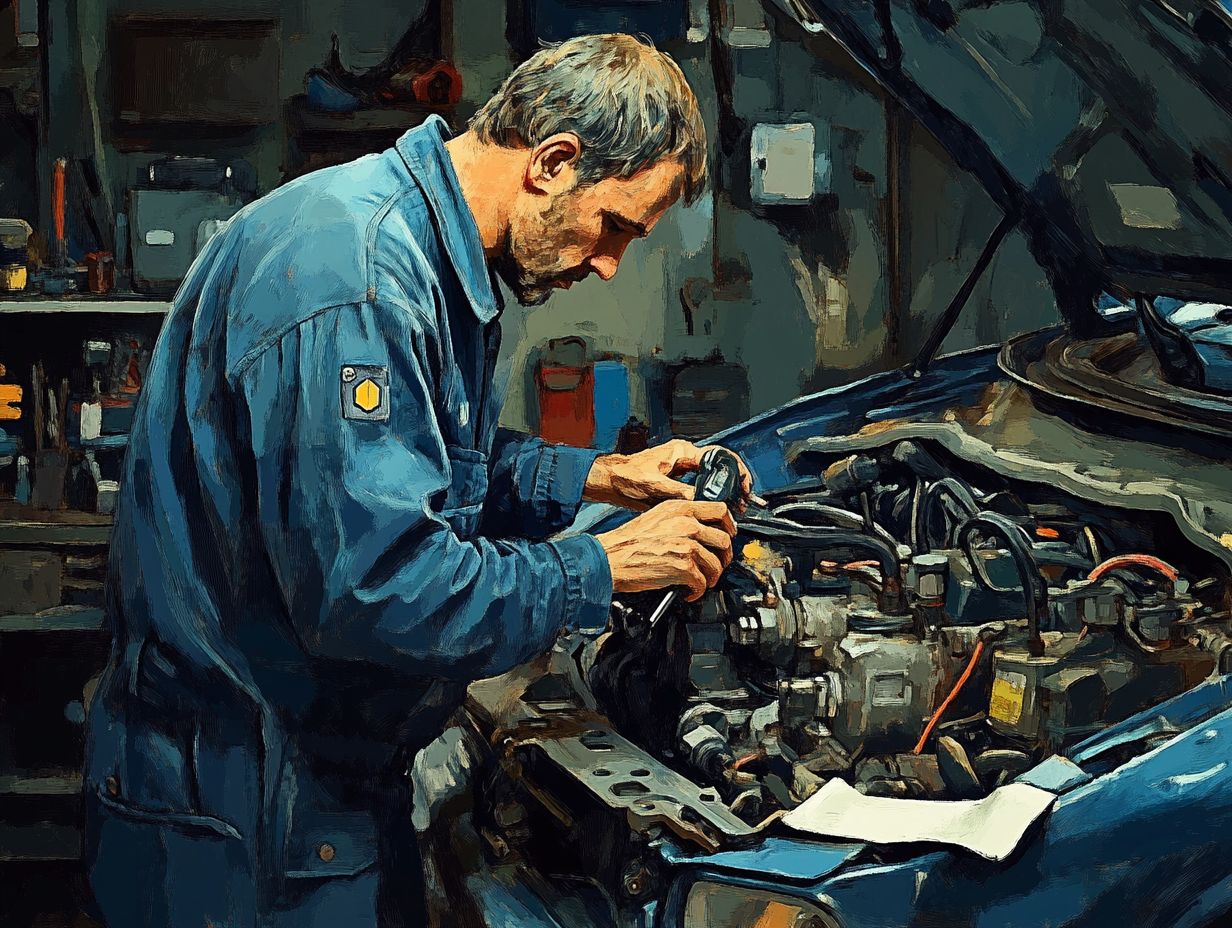
What Are the Best Practices for Car Maintenance?
The best practices for car maintenance are a set of guidelines that can help you keep your car in good condition and prolong its lifespan. These practices include regular inspections and servicing, keeping up with oil changes and tire rotations, and paying attention to warning signs from your car.
Why are Regular Inspections and Servicing Important for Car Maintenance?
Regular inspections and servicing help identify potential issues before they escalate into major problems. This can save you time and money in the long run, as well as ensure your safety on the road.
How Often Should I Get an Oil Change?
The frequency of oil changes can vary depending on your car’s make and model, as well as your driving habits. Generally, it is recommended to get an oil change every 5,000 to 7,500 miles or every 6 months, whichever comes first. It’s important to follow your car manufacturer’s guidelines for the best results.
What Are Some Signs That My Car Needs Maintenance?
Some common signs that your car needs maintenance include strange noises, warning lights on the dashboard, changes in performance, and unusual smells. If you notice any of these signs, get your car checked by a professional immediately!
Do I Need to Rotate My Tires?
Yes, regular tire rotations are an important part of car maintenance. This helps ensure even wear on all tires and can extend their lifespan. It is recommended to rotate your tires every 5,000 to 7,500 miles or during every other oil change.
Stay proactive and keep your car running smoothly. Schedule your next maintenance check today!
Can I Do Car Maintenance Myself?
You can do some car maintenance tasks at home. However, it s best to let a professional mechanic handle regular inspections and servicing.
Mechanics have the right tools and expertise to identify and fix issues, which keeps you safe on the road. Want to keep your car in top shape? Trust the pros to ensure your vehicle runs smoothly!


